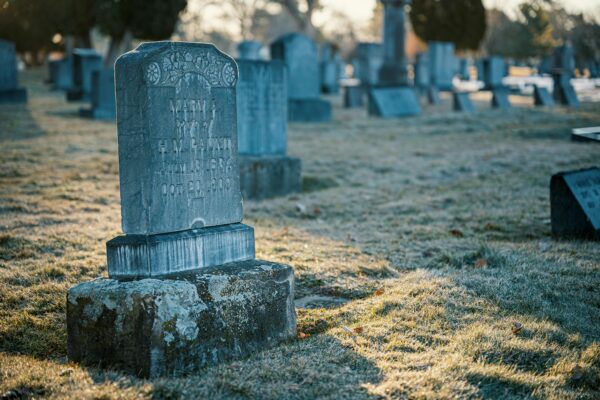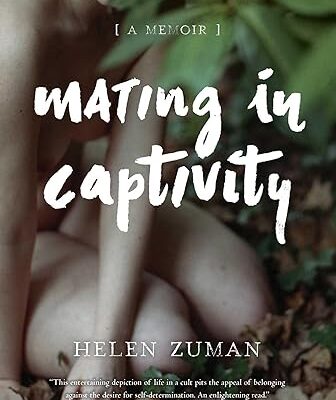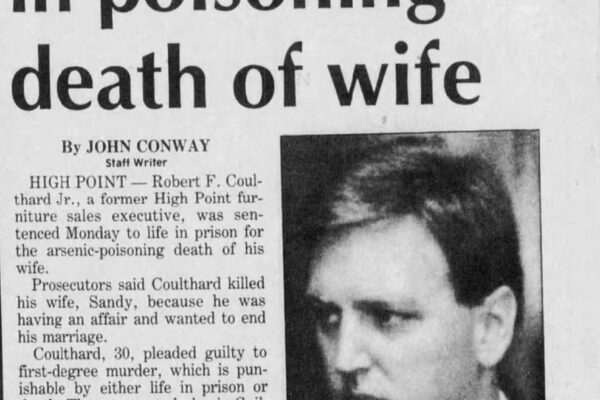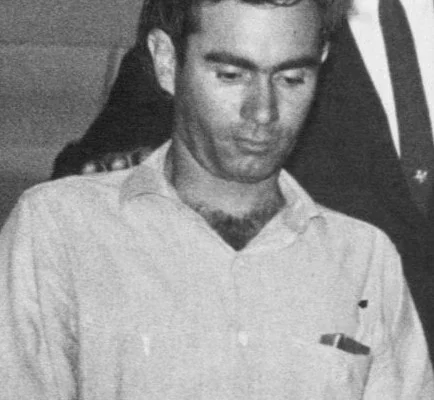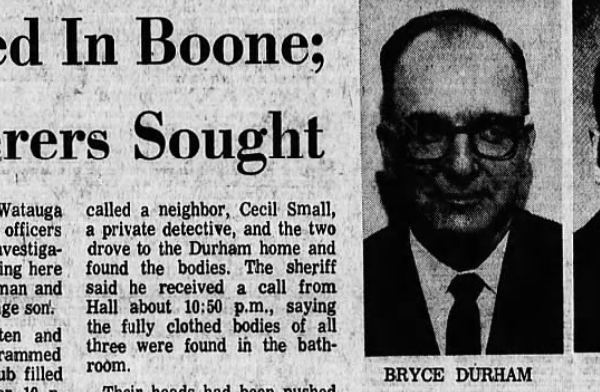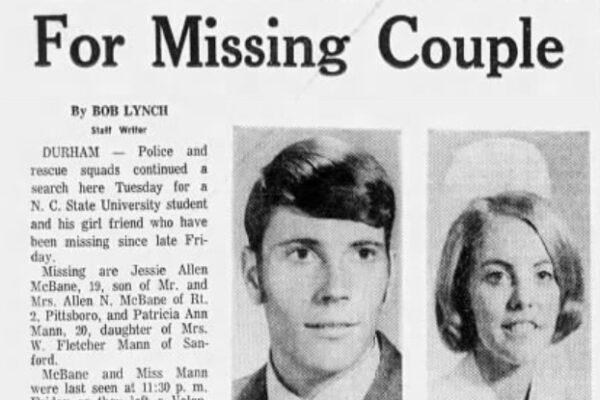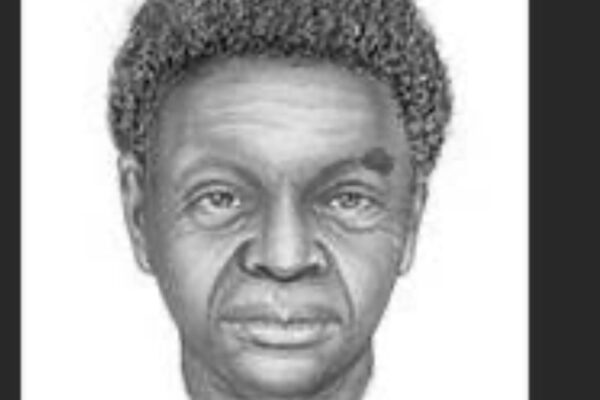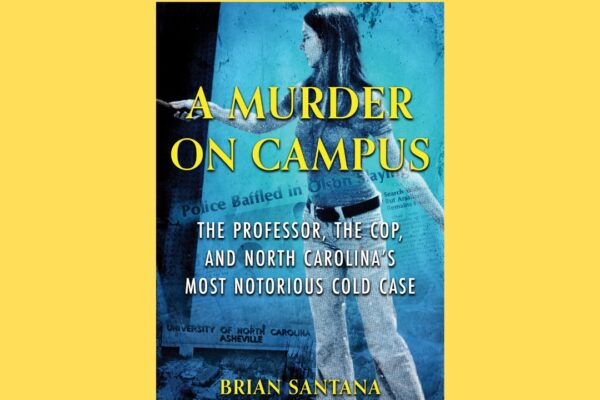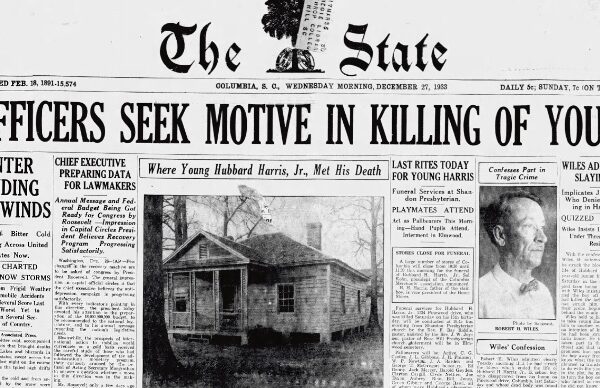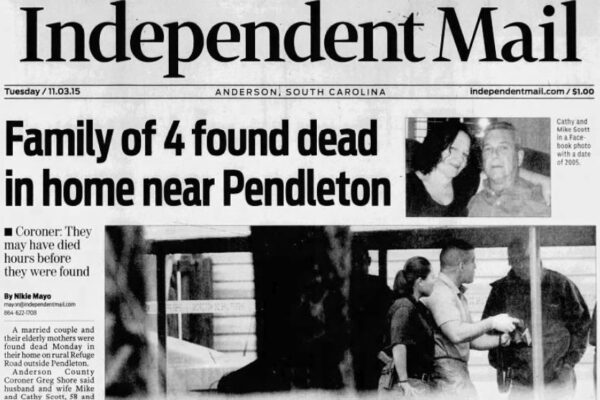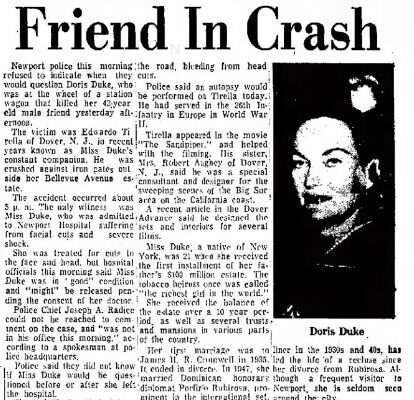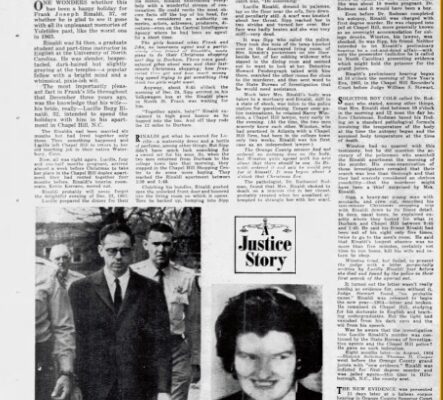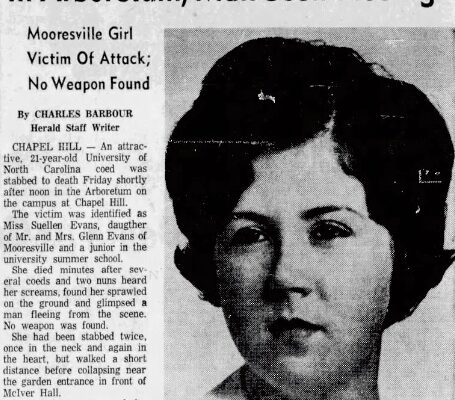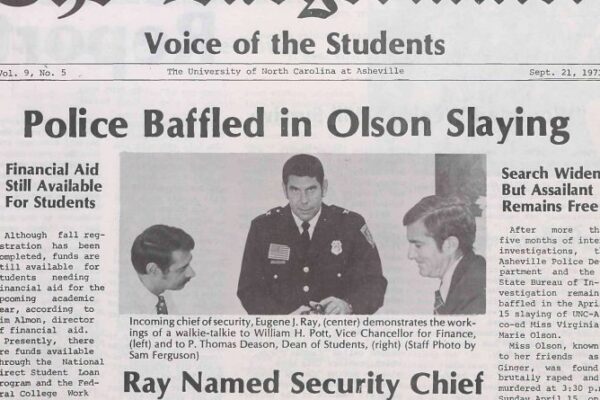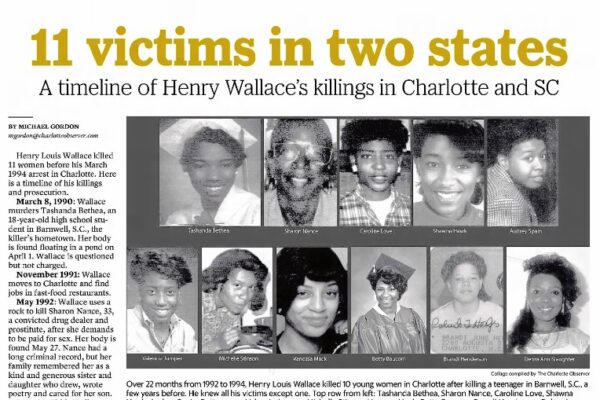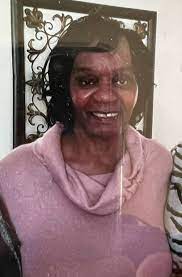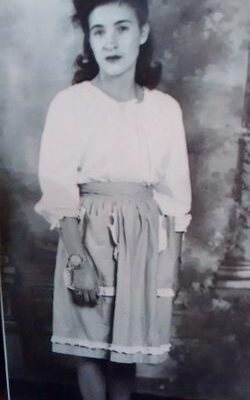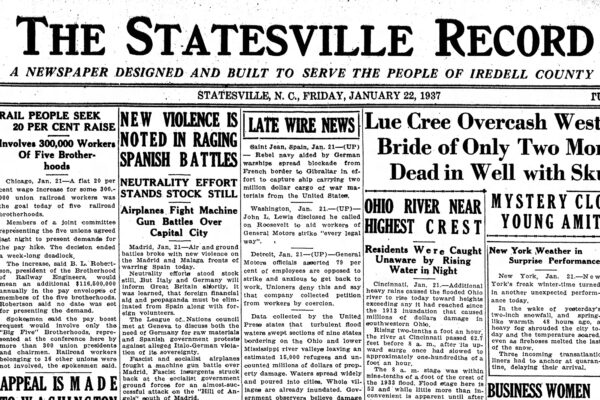Around 4 a.m. on May 31, 2003, 21-year-old rookie police officer Jeff Postell was making a second run patrolling the area behind the Valley Village shopping center in the town of Murphy, which at the time had under 2,000 residents, when he noticed a man ducking behind some milk crates at the Sav-A-Lot. Postell took a closer look because he thought he had interrupted a burglary in progress. When he noticed the man had a black object in his hand, Postell called for backup in case the item in question turned out to be a weapon.
The black object turned out to be a Mag-Lite. But when Postell’s backup, Cherokee County Deputy Sean Matthews, arrived, he thought the man with nicely trimmed hair and a mustache, dressed in a blue cotton work shirt, pants, and gray tennis shoes looked familiar. Upon closer inspection, he realized the elusive man could have been Eric Rudolph. At the scene, Matthews asked him if he was in fact, Rudolph. The man said, no, that his name was Jerry Wilson and he gave them a date of birth and address that turned out to be false. Once they were at the station, and the suspicious man was ensconced in the holding cell, officers noticed a scar on his chin and other marks that identified him as Rudolph. They went back and forth looking at the images circulated by the FBI and comparing them to the man in the cell. They pressed him again, until he admitted that he was in fact, Eric Rudolph. Fingerprinting the suspect confirmed his identity, and he finally said, “I’m Eric Robert Rudolph and you got me.”
They soon discovered a campsite of Rudolph’s nearby on the east side of Will Scott Mountain near Murphy High School. A footpath near the high school led to Valley River, which was very close to the Valley Village shopping center where Rudolph was discovered. It was also close to the home of former Cherokee County Sheriff Jack Thompson, who joked that Rudolph had probably been eating out of his garden. Law enforcement noted that the Rudolph was probably foraging for food in the dumpsters behind the shopping center when he was caught.
From Hero to Celebrity
Officer Sean Postell, who was only 16 years old when Rudolph first went on the run, became an instant local celebrity. People Magazine even made him one of the 25 hottest bachelors of 2003. He had only been on the job for 10 months but took his responsibilities seriously. Postell later explained that he always switched up his patrol routes so there was no trend anyone could follow.
Years later, he told the Gaston Gazette that he was annoyed when people would say he got lucky when he busted Rudolph. “I think the arrest of Eric Rudolph has nothing to do with luck. It was being vigilant, it was being responsible, being in the field, on the job, doing what people expected me to do, what people hired me to do.”
Immediately following Rudolph’s arrest, curious visitors flocked to the small community of Murphy, hoping to get a glimpse of the fugitive as he was taken from the courthouse. Some even wore commemorative t-shirts that read, “Eric Rudolph was caught in Murphy, N.C., and I was there!” They lingered around the small downtown area and had their pictures taken near the dumpster behind the Sav-A-Lot. A nearby coffee shop renamed drinks on their menu to offer the “Caught Ya Coffee,” “Eric Espresso,” and Captured Cappuccino.” Onlookers weren’t the only ones who set up camp—journalists from media outlets across the country arrived first in Murphy, and then into Asheville, where Rudolph was expected to be arraigned. His capture was covered everywhere from the local newspapers and television stations to The New York Times, The Los Angeles Times, CNN, The Atlanta Journal Constitution, and MSNBC, to name a few.
Death Penalty on the Table
On June 2, 2003, authorities announced Rudolph would be tried first in Birmingham, Alabama. Prosecutors believed the case was stronger there and that they could seek the death penalty because the bombing resulted in the death of Robert Sanderson, the police officer working security at the New Woman All Women Clinic.
He made his initial court appearance in Asheville and then was flown to Birmingham. The Northern Alabama U.S. Attorney announced she would seek the death penalty against Rudolph. A defense attorney Richard Jaffe was first assigned to the case before withdrawing. William Bowen took over, telling the media that his client was “a real gentleman.” “The public has a real misconception about who Eric Rudolph is and he will tell his story when the time is right.”
How Rudolph Survived
After his arrest, Rudolph showed investigators two different campsites about seven miles apart using a topographical map. One was just outside of Murphy and the other was in Clay County. He said he survived by killing 22 wild turkeys, an eight-point deer and a bear with a rifle he had taken with him. When they checked out the Clay County campsite, they found that he had buried wheeled trash cans, as well as strung them from the trees above so that bears couldn’t get to the food he’d stashed inside. He had apparently been taking these trash cans from the neighboring communities and wheeling them up the mountain. They found tarps, a small tent, and a patio made out of 18-inch rocks. They also found evidence he had been visiting the nearby Taco Bell in Murphy, possibly dumpster diving, because investigators found collectable cups that had been issued in 2002, along with wrappers from the restaurant.
During the years that Rudolph was evading capture, members of the media received conflicting opinions on local residents’ feelings about the fugitive. A lot of the population in Western North Carolina at that time considered themselves to be pro-life, so they could see his motives behind bombing the abortion clinics. Some people outright said they wouldn’t have turned Rudolph away if he asked them for help during his time on the run. But an article that ran in the June 8, 2003 edition of The Charlotte Observer took a deeper look at the local sentiment surrounding Rudolph. It was titled “This is Not a Hotbed of Conspiracy: Rural Residents admired Eric Rudolph for his elusiveness, not his viewpoints.”
The mayor of Murphy at the time, Bill Hughes, defended the local residents when approached by reporters after Rudolph’s capture. He said they never condoned what Rudolph was accused of and never gave him safe harbor. A professor from Davidson College spent time in Western North Carolina in 2000 while she researched the Rudolph case. She explained that she didn’t find anyone stating they were sympathetic to the bombings, but he was seen as a hero for his ability to elude the authorities who spent so much time searching for him. One local even said, “He was considered like Robin Hood around here. Most people kind of marveled at the fact that they sent all these agents around, and he outsmarted them.”
At the time, Mark Potok, a spokesperson for the Southern Poverty Law Center said he had come across what he called “a broad sympathy” for Rudolph. Potok said, “I don’t think that necessarily means these people support the murder of a police officer or bombing of an abortion clinic. But there was a romance in this. He was seen as a Butch Cassidy character. He braved the elements, defied the dogs, fled the sensors and hundreds of FBI agents, and for five years, got out clean.”
A former FBI executive, Chris Swecker, headed the Charlotte office when Rudolph was arrested. He shared that he believed Rudolph hadn’t had any outside help during his years on the run because he was a loner and wouldn’t have trusted anyone. He shared that Rudolph had stored 55-gallon buriels in the ground that were filled with grain, soy, and oats. He would visit a nearby granary at night and fill a backpack with supplies bit by bit. He knew when vegetables would be put out on the loading docks at local restaurants, and he would forage there when he could. Swecker also believed Rudolph would spend time in cabins in the mountains when they were unoccupied, and he would scout them out ahead of time. This could explain how he had a neatly trimmed mustache and haircut when he was caught.
Swecker said Rudolph had an air of defeat about him when he was arrested, and that he almost seemed relieved. He had tears in his eyes as he was getting on the plane to Atlanta, and Swecker believes he was emotional because he realized he would probably never see the mountains again.
Rudolph Pleads Guilty to Spare His Own Life
Eric Rudolph’s trial in Birmingham was scheduled to begin jury selection on April 6, 2005. Just three days later, Rudolph agreed to plead guilty to the bombings in order to avoid the possibility of receiving the death penalty. As part of the agreement, where he would receive multiple life sentences without the possibility of parole, he told them of 250 pounds of secret stashes of explosives he had hidden in North Carolina.
One bomb was found on a hill near a National Guard Armory in Murphy. Rudolph had planned to set it off when members of the task force were searching for him in 2001, but had apparently changed his mind. Bombs and bomb-making materials were found in at least five different areas, three of them populated. Authorities believed the dynamite was stolen from a rock quarry near Cherokee.
A federal defense attorney named Judy Clarke was assigned to Rudolph’s case by an Alabama judge. She helped broker the deal for him to plead guilty. At the time, she worked for the federal defender’s office in San Diego, California and was known for her staunch views against the death penalty. She had represented both the Unabomber Ted Kaczynski and Susan Smith from South Carolina, assisting with plea agreements that kept them off death row.
Survivors of the bombings had mixed reactions to the plea deal. Emily Lyons, the nurse who received life-threatening injuries during the Birmingham clinic bombing, said she was disappointed, but understand the necessity of the deal to potentially save lives from other bombs and acts of violence from Rudolph. Her husband said the benefit of the deal was that Rudolph would have to admit guilt, dismissing the arguments that he had been framed.
Alice Hawthorne’s husband also said he wasn’t thrilled with the decision. “But if it came in exchange for certain information, we could support it. If other people ended up killed or seriously injured, I didn’t want that on my conscience, holding out for the death penalty. He said he couldn’t speak for his late wife but believed she would have supported the decision as well.
Rudolph was also ordered to pay more than $1 million dollars in restitution to his victims. As part of this plea agreement, Rudolph agreed to answer questions posed to him by the federal government about his cases. He waived his right to appeal his conviction and sentence.
Rudolph presented authorities with an 11-page, typewritten statement where he offered a motive for his attacks in the Southeast. He shared his original plan was to force the cancellation of the Olympic Games, or at least empty the area around the venues and disrupt the flow of visitors and money the games were bringing into the city. What he had wanted was to plant five bombs over several different days, but poor planning on his part made this plan impossible to carry out. He felt remorseful when the blast from the bomb killed an innocent bystander, but said what he really wanted was to kill members of law enforcement. That was why he had tried to tip them off with the 911 call about 30 minutes before the bomb went off. He had planned to do the same thing with the four other bombs—call in a tip beforehand so only law enforcement responding to the threats would be harmed.
Initial Witness in Birmingham Bombing Named
In April 2005, The News and Observer shared information about the person instrumental in identifying Eric Rudolph as a suspect in the bombing at the abortion clinic in Birmingham. Jermaine Hughes was a 20-year-old student at the University of Alabama at Birmingham doing laundry around 7:30 in the morning when he heard a loud boom. He could see the clinic from the ground-floor window of the laundry room and was struck by an odd image—a man walking quickly away from the scene while others were running towards the clinic. He actually went out and got into his car to follow the man, who he saw get into a Nissan truck and appeared to be taking off a disguise.
Hughes followed the truck for a few blocks but eventually lost sight of him, stopping at a fast food restaurant to place a call to the police with a description. While there, he saw the truck again and told another nearby witness, Jeff Tickal, a local attorney. The two men got into their separate cars and attempted to follow the suspicious man. It was Tickal who wrote down the license plate of Eric Rudolph’s truck. Jermaine Hughes graduated from college in June of 2000 and then went on to attend law school. Authorities protected his identity for years because they were worried someone might try to harm him while Rudolph was in hiding, and then, awaiting trial.
A lot of people wondered if Sean Postell was eligible to receive the $1 million reward for finding Rudolph. And while the mayor of Murphy pushed for him to receive it, he never did. He said he would have donated it if he had received it, because he felt like he was just doing his job when the arrest happened. Postell later moved up north and worked with the Boston College Police Department, and then served a few terms on the local City Council there.
In 2005, Henry Schuster and Charles Stone published the book, “Hunting Eric Rudolph: An Insider’s Account of the Five-Year Search for the Olympic Bombing Suspect.” Schuster had worked a producer for CNN and Stone was the head of the Georgia Bureau of Investigation Anti-Terrorist Unit.
While incarcerated in a federal prison in Colorado, Rudolph has not stayed quiet.
In 2013, with the help of his brother Daniel, Eric Rudolph self-published a 394-page memoir titled “Between the Lines of Drift: The Memoirs of a Militant.” The U.S. government immediately seized $200 in sales from the book, as he still owed $1 millions in restitution to his victims, and money from the book was earmarked for that fund. He immediately filed a request to keep the money from his autobiography, and a judge in Alabama quickly denied the request for a hearing, saying Rudolph gave up money from any publications in his plea agreement.
In June of 2020, Rudolph filed an 11-page appellate motion to vacate two of his life sentences, saying they were in violation of the constitution and “in excess of the maximum” allowed by law. Three judges from the 11th Circuit Panel vacated his motion in July of 2021, stating, “Eric Rudolph is bound by the terms of his own bargain. He negotiated to spare his life, and in return he waived the right to collaterally attack his sentences in any post-conviction proceedings. We will not disrupt that agreement.”
Show Sources:
https://apnews.com/general-news-32e188414fc24d88af6f4410a3d7a0ae
https://www.history.com/this-day-in-history/olympic-park-bomber-eric-rudolph-agrees-to-plead-guilty
https://www.fbi.gov/history/famous-cases/eric-rudolph
https://www.npr.org/2005/04/14/4600480/full-text-of-eric-rudolphs-confession
Asheville Citizen Times
June 1, 2003
Rudolph Captured
Page 1
https://www.newspapers.com/image/200047948
Page 2
https://www.newspapers.com/image/200047961
The Charlotte Observer
June 1, 2003
The Evidence That Made Rudolph a Wanted Man
https://www.newspapers.com/image/630589375
Asheville Citizen-Times
June 2, 2003
Shameless gawkers invade quiet of Murphy
https://www.newspapers.com/image/200059553
Asheville Citizen-Times
June 8, 2003
Debunking the Rudolph mystique
Page 1
https://www.newspapers.com/image/200080138
Page 2
https://www.newspapers.com/image/200080196
The Charlotte Observer
June 3, 2003
Rudolph shipped off for 1st trial in Alabama
Page 1
https://www.newspapers.com/image/630608360
Page 2
https://www.newspapers.com/image/630605686
https://www.nbcnews.com/id/wbna7445254
The Charlotte Observer
June 8, 2003
Murphy rejects media portrayal
Page 1
https://www.newspapers.com/image/630592687
Page 6
https://www.newspapers.com/image/630592828
Asheville Citizen-Times
June 9, 2003
Opinions differ on if Rudolph had help
https://www.newspapers.com/image/200090370
Atlanta Journal Constitution
April 5, 2005
The Trial of Eric Rudolph
https://www.newspapers.com/image/422698014
Atlanta Journal Constitution
April 9, 2005
Rudolph cuts deal
https://www.newspapers.com/image/422742456
Page 2
https://www.newspapers.com/image/422729991/?match=1&terms=Plea
Atlanta Journal Constitution
April 9, 2005
A life on the fringe, on the run
https://www.newspapers.com/image/422730496
The Charlotte Observer
April 14, 2005
Rudolph had plans for larger bombing spree
https://www.newspapers.com/image/200627494
Bomber planned more attacks
Page 2
https://www.newspapers.com/image/631371346
Information about college student who spotted Rudolph leaving clinic
The News and Observer
April 14, 2005





